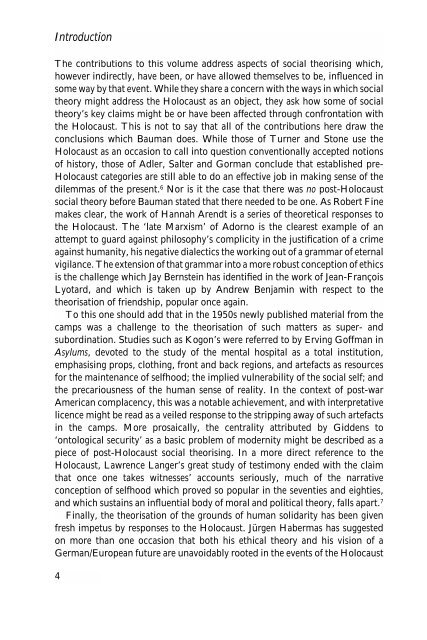Create successful ePaper yourself
Turn your PDF publications into a flip-book with our unique Google optimized e-Paper software.
Introduction<br />
The contributions to this volume address aspects of social <strong>the</strong>orising which,<br />
however indirectly, have been, or have allowed <strong>the</strong>mselves to be, influenced in<br />
some way by that event. While <strong>the</strong>y share a concern with <strong>the</strong> ways in which social<br />
<strong>the</strong>ory might address <strong>the</strong> <strong>Holocaust</strong> as an object, <strong>the</strong>y ask how some of social<br />
<strong>the</strong>ory’s key claims might be or have been affected through confrontation with<br />
<strong>the</strong> <strong>Holocaust</strong>. This is not to say that all of <strong>the</strong> contributions here draw <strong>the</strong><br />
conclusions which Bauman does. While those of Turner and Stone use <strong>the</strong><br />
<strong>Holocaust</strong> as an occasion to call into question conventionally accepted notions<br />
of history, those of Adler, Salter and Gorman conclude that established pre-<br />
<strong>Holocaust</strong> categories are still able to do an effective job in making sense of <strong>the</strong><br />
dilemmas of <strong>the</strong> present. 6 Nor is it <strong>the</strong> case that <strong>the</strong>re was no post-<strong>Holocaust</strong><br />
social <strong>the</strong>ory before Bauman stated that <strong>the</strong>re needed to be one. As Robert Fine<br />
makes clear, <strong>the</strong> work of Hannah Arendt is a series of <strong>the</strong>oretical responses to<br />
<strong>the</strong> <strong>Holocaust</strong>. The ‘late Marxism’ of Adorno is <strong>the</strong> clearest example of an<br />
attempt to guard against philosophy’s complicity in <strong>the</strong> justification of a crime<br />
against humanity, his negative dialectics <strong>the</strong> working out of a grammar of eternal<br />
vigilance. The extension of that grammar into a more robust conception of ethics<br />
is <strong>the</strong> challenge which Jay Bernstein has identified in <strong>the</strong> work of Jean-François<br />
Lyotard, and which is taken up by Andrew Benjamin with respect to <strong>the</strong><br />
<strong>the</strong>orisation of friendship, popular once again.<br />
To this one should add that in <strong>the</strong> 1950s newly published material from <strong>the</strong><br />
camps was a challenge to <strong>the</strong> <strong>the</strong>orisation of such matters as super- and<br />
subordination. Studies such as Kogon’s were referred to by Erving Goffman in<br />
Asylums, devoted to <strong>the</strong> study of <strong>the</strong> mental hospital as a total institution,<br />
emphasising props, clothing, front and back regions, and artefacts as resources<br />
for <strong>the</strong> maintenance of selfhood; <strong>the</strong> implied vulnerability of <strong>the</strong> social self; and<br />
<strong>the</strong> precariousness of <strong>the</strong> human sense of reality. In <strong>the</strong> context of post-war<br />
American complacency, this was a notable achievement, and with interpretative<br />
licence might be read as a veiled response to <strong>the</strong> stripping away of such artefacts<br />
in <strong>the</strong> camps. More prosaically, <strong>the</strong> centrality attributed by Giddens to<br />
‘ontological security’ as a basic problem of modernity might be described as a<br />
piece of post-<strong>Holocaust</strong> social <strong>the</strong>orising. In a more direct reference to <strong>the</strong><br />
<strong>Holocaust</strong>, Lawrence Langer’s great study of testimony ended with <strong>the</strong> claim<br />
that once one takes witnesses’ accounts seriously, much of <strong>the</strong> narrative<br />
conception of selfhood which proved so popular in <strong>the</strong> seventies and eighties,<br />
and which sustains an influential body of moral and political <strong>the</strong>ory, falls apart. 7<br />
Finally, <strong>the</strong> <strong>the</strong>orisation of <strong>the</strong> grounds of human solidarity has been given<br />
fresh impetus by responses to <strong>the</strong> <strong>Holocaust</strong>. Jürgen Habermas has suggested<br />
on more than one occasion that both his ethical <strong>the</strong>ory and his vision of a<br />
German/European future are unavoidably rooted in <strong>the</strong> events of <strong>the</strong> <strong>Holocaust</strong><br />
4

















